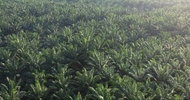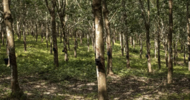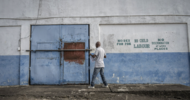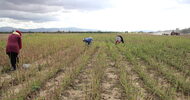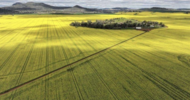National elites and foreign investors in Africa will be protected by the AfCFTA. But the same cannot be said for local communities and their rights over agricultural land. In the name of climate, the AfCFTA will boost the development of land deals for carbon in Africa.
Ethiopia’s hopes of ushering in a new era of commercial farming ventures rested in large part on the shoulders of the Gambella Regional State. Recent years have seen hundreds of investors granted licenses and credit to establish commercial farms in the southwestern corner of the country, but little has come from the efforts.
- The Reporter
-
28 October 2024
In recent years, Gulf economies have tackled their food dependencies not just by importing foodstuffs but through land enclosures, or the purchasing of agricultural land abroad, particularly in the Middle East, North and East Africa (but also as far as the United States and Australia)
The Bodi people have been decimated since the Gibe III dam came into operation and diverted the Omo River’s waters to large-scale irrigation schemes.
- African Arguments
-
29 May 2024
Globe-trotting billionaire Mo Dewji made a fortune in East Africa selling palm oil, rope, and soda. Now he says he's trying to acquire 100,000 ha in Rufiji and another part of Tanzania for sugarcane and cereal plantations.
The Swiss-based multinational ASC Impact claims to have acquired 22,000 hectares in Ethiopia’s remote Gambela state along the border with South Sudan for large-scale tree plantations, carbon credits and agriculture.
The case stems from accusations lodged by the Djiboutian Ambassador in 2018, asserting that Karuturi neglected to meet the terms of agricultural agreements signed in 2011 and 2012 for activities in Ethiopia.
Tanzania is offering more than 60,000 hectares of fertile land to both foreign and domestic companies to invest in large-scale farming at Mkulazi area in Morogoro.
Elite Agro Projects plans to establish a wheat farm in Ethiopia, where it already operates a flower farm.
Researchers say the construction of a dam and sugarcane plantations has dispossessed the Lower Omo’s peoples of their farming and grazing lands and irreversibly altered the natural cycles of the Omo River.
Farmland purchases by the Harvard endowment contributed to a climate of anxiety, fear, and strain on Brazilian subsistence farmers.
- The Crimson
-
17 April 2023
In recent years, the Ethiopian government has been enthusiastically renting large swathes of its territory to both local and foreign investors, regardless of who is already living there.
- Mail & Guardian
-
03 April 2023
Zambia has allocated 20,000 hectares of land to large-scale farmers in Kenya to start growing maize which will be exported in the country.
With attention centered on the civil war in the country over the last two years, the hunger and health crisis in the Omo Valley caused by the Gibe III Dam and the Kuraz Sugar Development Project has gone ignored.
- Oakland Institute
-
08 February 2023
Article analyses the effects on local actors, their land access, land use and tenure security of a large-scale land deal in northern Laos that a Chinese company initiated but subsequently abandoned.
- Front. Sustain. Food Syst.
-
27 June 2022
The digitalisation of information on land and natural resources is exacerbating land grabbing in the remaining agricultural frontiers of Latin America.
The global land rush has highlighted deep-seated tensions between competing visions of agriculture, food systems, territory and society.
- Afronomics Law
-
17 November 2021
On the eve of an annual gathering of public development banks, 280 groups from 70 countries sign letter slamming them for bankrolling the expansion of industrial agriculture.
The Agricultural Products Industrial Park, Port and New City in Kilwa, Tanzania involves 80,000 acres of land, and the companies have obtained a land use certificate from the Tanzania government.
In this short paper, we discuss the various ways in which scholars and activists of the global food economy/regime/system examine the relationships among producers, the state and capital.
As the recently published book The Transnational Land Rush in Africa – A Decade After the Spike reveals, vulnerable people were very much the losers.
Egypt has agreed with Sudan to study a plan to grow crops together on Sudanese land within the framework of economic cooperation between the two countries.
- Al-Monitor
-
16 September 2020
An analysis of the global impact of a Thai court judgement, which provides a judicial forum to farmers from Cambodia, who were victims of transnational land grabbing.
- Global Policy
-
19 August 2020
The Development Bank of Ethiopia suspending loans for commercial farms because of the failure of numerous farms in Gambella, where the Bank was even tricked into giving two loans for a single agriculture project.
- Addis Fortune
-
16 April 2020
Too few investors knew the land; too many deals were crooked. Yet officials hint that the government wants to promote huge farms once more, this time by expanding wheat production to boost food security.
Ethiopia's Mursi tribe says they were imprisoned and tortured to protect Chinese sugar plantations.
Dutch flower growers who dominate the flower farms in Kenya are being accused of avoiding taxation while proudly wearing the “fair trade” badge.
When Gulf nations face food, security, and water scarcity issues, one response is to seek lucrative agricultural investments in fertile African lands. Yet, while such deals can bring benefits to the countries involved, there are also sizeable risks
Companies from countries across the world have acquired fertile Nile-irrigated land for growing food crops, non-food agricultural commodities such as alfalfa, flowers, tobacco, and biofuels, rearing livestock and logging trees.
- Pulitzer Center
-
01 February 2020
The British government is ramping up its policy to divert taxpayers’ money into private hands and plantation companies like Feronia – and away from the world’s poorest people, warns Labour’s Dan Carden.
- New Internationalist
-
20 January 2020








